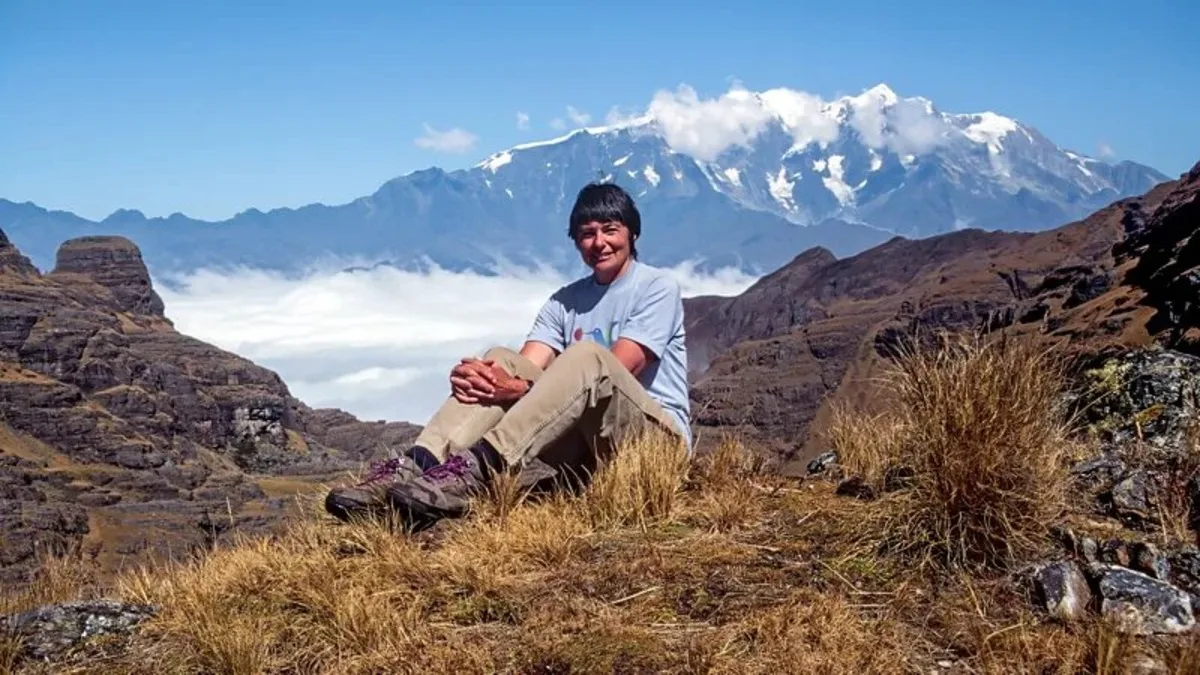Hilary Bradt in Peru
Peru has remained one of Bradt’s favorite destinations (Credit: Hilary Bradt)
For half a century, the co-founder of the globe’s most extensive independently owned guidebook publisher has been igniting wanderlust in adventurers, urging them to venture beyond conventional routes.
Back in 1973, Hilary Bradt, alongside her then-partner George, embarked on a quest driven by a whisper heard near the Ecuador-Peru border. It spoke of a hidden trail snaking through the Peruvian Andes from the ancient Inca bastion of Cusco to Machu Picchu. After enduring numerous days of getting disoriented and hacking through dense foliage, the duo finally traversed the trail in its entirety. They then hopped onto a river barge in the Amazon, meticulously documenting their journey—a narrative that would birth the first-ever published depiction of the full Inca Trail in English. This marked the inception of Bradt Guides, the largest independently owned guidebook company worldwide, celebrating its 50th anniversary in 2024.
Following George’s sudden departure from both the company and their marriage in 1980, Bradt could have retreated to England to resume her former career as an occupational therapist. Instead, she forged ahead independently, penning guides to uncharted territories like Uganda, Yugoslavia, North Korea, Eritrea, and Madagascar. Her endeavors introduced numerous off-the-beaten-path destinations to the masses, earning her accolades like the Member of the Order of the British Empire from Queen Elizabeth in 2008 for her contributions to tourism and charity.
From hitchhiking across the Middle East for three months to facing arrest in Tanzania under suspicion of espionage, Bradt recounts her myriad adventures in her upcoming book, “Taking the Risk.” Recently, the octogenarian shared insights with the BBC from her Devon abode, delving into her affinity for underrepresented locales, the ripple effect of popularizing “bucket-list” destinations, and the evolution of travel over the past five decades—especially for women.
What prompted you and George to initiate Bradt Guides in 1974?
Initiation would be an understatement. In 1973, we scribbled our first guide on a river barge in Bolivia, on an Amazon tributary. Titled “Backpacking Along Ancient Ways in Peru and Bolivia,” we had it printed by George’s mother in Boston in 1974. But calling it a “launch” would be a stretch. It circulated in America and Britain while we were still traversing South America.
Upon our return to Britain, we found ourselves with a meager £680 in our bank account. A renowned British publisher, the sole guidebook purveyor at the time, proposed publishing a mainstream guide to Peru without necessitating our return to the country. They suggested we compile it based on brochures—a notion that appalled us. If this was the state of publishing, we decided to take matters into our own hands. That, my friend, was the true inception.
What fueled your decision to embark on this guide’s creation in the first place?
Throughout my tenure at the helm, our guiding principle has been to cater to travelers’ needs. It’s an ethos we still uphold, prioritizing necessity over profitability. Encounters with fellow wanderers—gringos in Latin America—spurred us on. They were intrigued by our journeys, particularly the uncharted trails like the Inca Trail. Encouragement poured in, nudging us toward penning our adventures. Our debut book, albeit riddled with misprints, bore invaluable information, laying the foundation for what was to come.
Throughout these 50 years, Bradt Guides have become synonymous with offbeat destinations. Which guides stand out to you the most?
Rwanda holds a special place. The author of our first edition had lost a friend in the genocide, compelling her to seek solace in the country. Her guide, penned merely four years post-tragedy, ignited hope amidst despair, galvanizing tour operators’ interest. This catalytic effort played a pivotal role in Rwanda’s resurgence, earning our author an audience with the nation’s president.
Additionally, our maiden guides to Vietnam and Mozambique were milestones. Half of our repertoire comprises trailblazing guides, unveiling uncharted territories to the world.
Albania, albeit a communist enclave during our initial foray, emerged as a delightful endeavor. Our first Albania guide, akin to North Korea, necessitated organized tours. Yet, it flourished over time, attesting to the gradual allure of unconventional locales.
Why did you opt for these lesser-explored destinations amidst the tourism boom of the ’70s and ’80s, dominated by Italy, Spain, and France?
The pioneering spirit, that’s all me. It dawned on me post-George’s departure when I assumed sole proprietorship: what’s the point of treading familiar ground? Competing with industry giants seemed futile for a fledgling publisher. Logic dictated embracing uncharted territories—where demand was assured, not manufactured. Unlike the glossy embellishments required for mainstream guides, our focus remained steadfast: cater to genuine wanderlust.
#TravelInspiration #AdventureSeekers #OffTheBeatenPath #TravelPioneer #ExploreWithBradtGuides

